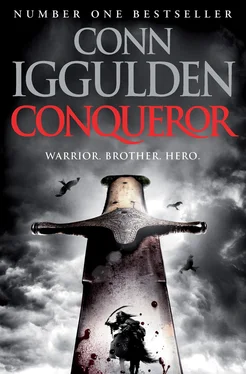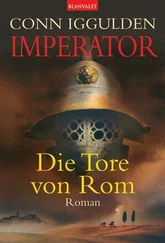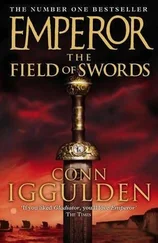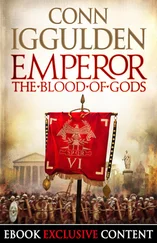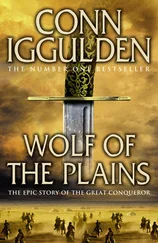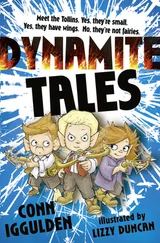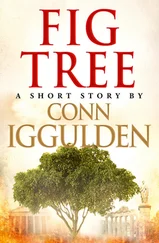Guyuk knew he cut a fine figure on his horse, a white stallion from the khanate herd he had inherited. Despite the nightly feasts of wine and rich foods, his youth kept him slim, burning off his excesses. He had not brought the vast panoply of carts and materials his army required for a long campaign, keeping the myth of an exercise in the mountains as long as he could. Even so, each of his warriors had two or three spare mounts. Between them, Guyuk had supplies and comforts enough to make the trip a pleasure rather than a chore.
It was easy to imagine his grandfather riding the same lands, with scouts ahead and an army behind him. Guyuk had his own memories of the Great Trek into the west with Tsubodai and it was almost nostalgic to be with an army once again. It was true that they set off mid-morning rather than at dawn, as it took time for Guyuk’s head to cease pounding and his stomach to settle. He rode with bloodshot eyes, but the exertion cleared his head and he was soon hungry again. He touched his waist as he rode, dreading the first feeling of thickness there. Surely riding two thousand miles would keep him trim and strengthen the muscles in his stomach.
Guyuk’s mood grew bitter as he dragged his gaze back to the plains ahead of him. He had to be discreet, though at times he thought all his generals knew his secrets. Yet he held back from complete honesty, for all he desired it. Mongke was not far behind him in the tumans, and in that serious, unsmiling face, Guyuk saw all the others who would condemn him for his appetites. He thought again of Mongke’s mother, the smiling vixen who had twisted his father to her will. Guyuk wanted her gone, but he could hardly banish the mother of such a senior man. His mind worked as he rode, sinking into fantasies in which he would whisper his needs to some trusted warrior and Sorhatani would simply vanish. There were those who would not question the khan’s word, though it cost them their own lives. It was a heady power, but he was still wary of it. He guarded his tongue as best he could, until the strain became impossible.
Guyuk jerked from his reverie as he heard battle horns sound on his left. He looked up to see two tumans charging with lances, as they had already done a dozen times that morning. They rode hard for two or three miles, then allowed their mounts to graze as the others caught up. It was the public face of his manoeuvres and he could not complain that he found the crashing and shouting irritating. Whenever they stopped, thousands of warriors would set up targets and practise shots at full gallop, loosing and collecting thousands of shafts. They were impressive and at first he had thrilled to see such power under his command. It had begun to pall for him after the first week, though he idled time away imagining Batu strapped to a target.
Even the thought of that brought a flush to Guyuk’s cheeks. He had built a network of spies to dwarf anything his father had ever controlled. In the city, a thousand conversations were reported along a chain of men, collected at the end of each day by his spymaster, then brought to Guyuk. Even in the tumans, men who were foolish enough to criticise their khan found themselves dragged before him to answer for their foolish words. Yet there had been no criticism of Batu. He had been Tsubodai’s favourite, they said, a grandson of Genghis who had not sullied his hands with politics and deals. Guyuk seethed at the details he recalled. The common warriors had learned to guard their speech, even among friends. The information coming in had died to a trickle after the first examples had been made, but Guyuk still listened. He had ordered men bound to a post and beaten bloody. He had ordered two killed on the grounds that they spoke of insurrection and disloyalty to the khan. Guyuk had watched one man’s tongue being torn out with iron pincers before he was killed. He smiled slightly at the memory. There would be no more of that sort of talk.
He was sure such events could not damage his authority. If anything, he thought the examples he made increased it. It hurt nothing for the men to know their khan would enforce his rule just as ruthlessly as Genghis ever had. The warriors went in fear of him and that was only right. They would not run from an enemy with Guyuk watching them.
He rode west with his army for a hundred miles or more, stopping for two days to practise formations and charges. On the third morning, Guyuk swung the army to the north, riding towards the Russian lands his father had so foolishly granted to an enemy. It was a tainted line, he had realised. Batu’s father had been a traitor and his faults had bred true. There could never be trust between them, even if he had summoned Batu to Karakorum and taken his oath. Such a line would poison the new nation and could only be cut down and burnt to the root. He thought of his mother and Sorhatani, sisters in their manipulation of him. Neither would understand the need to remove his enemies. Leaving Batu in peace was not the act of a great khan, but of a weak one, too frightened to engage. Guyuk smiled to himself. He would make an example that would light the way forward, a demonstration to all those others who sought to test the new khan’s strength. Let them all see! From the princes of Koryo to the Arabs and the nations of the west. Let them hear of Batu’s death and hesitate as they considered resisting the Mongol nation. Batu’s fate would be public and terrible. It would move from mouth to ear across the deserts, the mountains and green plains. Batu could be Guyuk’s bonfire on the mountaintop, his message to all his vassal states. In that, Batu would serve his khan well.
From two miles away, Kublai watched the army passing, a vast, dusty column of men and horses. It was dangerous to come within sight of them, but he knew the scouting patterns as well as anyone alive and he worked around them, shadowing the khan’s force as they rode. It helped that he was not the only man alive on the plains. The movement of so many warriors and horses drove goatherders and poor families from their homes, so that they could often be seen on the outskirts, moving swiftly out of the khan’s path. Kublai himself was dressed in a dirty old deel, his face and hands almost black with grime. He hoped he could pass for one of them if he was discovered.
As he lay in long grass, he ran his hand down the dark muzzle and lips of his horse. It lay completely flat, its cheek touching the ground as it had been trained. Even so, the animal needed his touch to remain in such an unnatural position. The liquid brown eyes watched him and he could not prevent the tail whisking at flies and disturbing the cover. Nothing was completely safe within sight of the tumans and their scouts, but he had to know. The message he had memorised would earn death for many if it ever became known to the khan. Kublai knew he had to be certain it was even needed. If the khan marched his army away from Batu’s lands, Kublai could simply slip away to Karakorum. It would never be mentioned again.
The tumans had swung north that morning. Karakorum was long behind them and Kublai had watched with growing anger, certain that he saw the khan’s true purpose at last. Even then, he had waited, watching to be certain they did not turn back or stop at some lake to water the animals. He had dried milk and meat in his saddlebags and he could cover almost twice the distance they did each day if he had to. At best, the khan’s army made forty miles, hardly starting before noon and riding without haste. Kublai kept his eyes on them, wanting to be wrong until he could not deny the truth any longer. When the last ranks had gone, he tapped his horse on the muzzle, making it jump up. He had rested all day, but he could not race madly through the night. If his horse broke a leg on unseen ground, he would not catch them again and Batu would never get the warning.
Читать дальше
